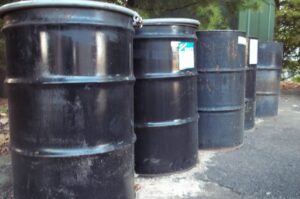Hotels are bustling hubs of activity, providing a home away from home for travelers, tourists, and business professionals. In their day-to-day operations, hotels generate various types of waste, including hazardous waste that requires special attention and responsible disposal methods. Properly managing hazardous waste drum disposal is not only crucial for compliance with environmental regulations but also for safeguarding the health and well-being of employees, guests, and the surrounding community.
In this comprehensive guide, we will delve into the challenges hotels face regarding hazardous waste disposal and outline best practices and solutions to ensure that hotels handle this issue effectively and responsibly.
Understanding Hazardous Waste in Hotels
Before we dive into the specifics of hazardous waste drum disposal, it’s essential to grasp the types of hazardous waste generated by hotels. Hazardous waste in hotels typically falls into the following categories:
Chemicals and Cleaning Products: Hotels use a wide range of chemicals and cleaning products to maintain cleanliness and hygiene. These include solvents, detergents, disinfectants, and pesticides, which can be harmful if not disposed of properly.
Pharmaceuticals: Expired or unused medications, both over-the-counter and prescription drugs, often accumulate in hotels. Proper disposal of pharmaceutical waste is essential to prevent potential harm and environmental contamination.
Electronic Waste (E-Waste): With the constant need for technology upgrades and replacements, hotels frequently accumulate electronic waste, such as old computers, phones, and other electronic devices. Many of these contain hazardous components like heavy metals.
Batteries: Batteries from remote controls, flashlights, and other electronic devices can contain hazardous materials like lead and cadmium, making them unsuitable for regular disposal.
Fluorescent Light Bulbs: These energy-efficient bulbs contain small amounts of mercury, making them hazardous if broken or improperly discarded.
Paints and Solvents: Hotels often have painting and maintenance projects that generate hazardous waste, including used paints, solvents, and varnishes.
Hazardous Waste Drums: Some hotels may have hazardous waste drums containing a mix of hazardous materials. These drums need special handling and disposal procedures.
Legal and Regulatory Obligations
Hotels, like any other business, are subject to environmental regulations that govern the proper disposal of hazardous waste. In the United States, the Resource Conservation and Recovery Act (RCRA) is the primary federal law that regulates hazardous waste management. Hotels must be aware of these regulations, which may vary by state, and ensure compliance to avoid potential fines and penalties.
It is essential for hotels to:
Identify and classify hazardous waste accurately: To comply with regulations, hotels must classify the waste they generate correctly. This includes determining if waste is hazardous, non-hazardous, or universal waste (waste that is hazardous in certain quantities).
Keep records: Accurate record-keeping is crucial. Hotels should maintain records of the waste generated, the type of waste, disposal methods, and the service provider used for disposal.
Use an EPA ID number: If a hotel generates significant quantities of hazardous waste, they may need to obtain an EPA ID number, which is essential for reporting and compliance.
Employ certified waste management services: Ensure that the waste management service provider is certified and compliant with all relevant regulations.
Educate staff: Properly train employees to identify and handle hazardous waste safely. Staff should be aware of the potential risks and the importance of compliance.
Best Practices for Hazardous Waste Drum Disposal
Now that we have covered the basics of hazardous waste in hotels and the legal obligations, let’s explore best practices for the disposal of hazardous waste drums.
Segregation and Labeling
The first step in responsible hazardous waste management is to segregate different types of waste. Clearly labeled containers and drums can help ensure that hazardous materials are not mixed with non-hazardous waste. Hotels should establish a system for segregating waste at its source, allowing for easier identification and disposal.
On-Site Storage
Hotels should have a designated and secure area for the temporary storage of hazardous waste drums. The storage area should be well-ventilated, well-lit, and equipped with spill containment measures. Drums should be stored away from sources of heat and open flames to reduce the risk of fires or chemical reactions.
Hazardous Waste Drum Inspection
Regular inspections of hazardous waste drums are vital to identify leaks, damage, or signs of deterioration. Damaged drums can lead to spills, which can pose a significant danger to hotel employees, guests, and the environment. A proactive approach to drum maintenance can prevent such incidents.
Waste Minimization and Reduction
Hotels should prioritize waste minimization and reduction efforts. This includes:
Source Reduction: Use environmentally-friendly and non-hazardous alternatives whenever possible, and reduce the quantities of hazardous materials used. b. Recycling: Identify opportunities to recycle certain types of hazardous waste, such as e-waste and batteries. c. Purchase Control: Carefully manage inventory to minimize the expiration or obsolescence of products and medications.
Proper Packaging
When disposing of hazardous waste in drums, hotels must use containers that meet regulatory requirements. These containers should be designed for the specific type of waste being stored, ensuring that they can withstand the corrosive or reactive nature of the materials.
Transportation
Transporting hazardous waste drums requires adherence to strict regulations. The hotel should contract with a licensed hazardous waste disposal service provider with experience in transporting these materials. Ensure that the provider follows all safety protocols and regulations, including labeling, manifesting, and transportation permits.
Documentation
Accurate documentation is essential in hazardous waste disposal. This includes generating and maintaining hazardous waste manifests, which detail the type and quantity of waste, as well as the disposal facility’s information. These documents must be retained for the required period, typically three years.
Emergency Response Plan
Hotels should have a well-defined emergency response plan for hazardous waste incidents. This includes training staff on how to respond to spills, leaks, or other hazardous waste-related emergencies. Having the right equipment, personal protective gear, and knowledge can mitigate the risks of accidents.
Partner with a Certified Waste Management Service
One of the most important steps in proper hazardous waste drum disposal is partnering with a certified waste management service. These service providers are experts in the field and can ensure that waste is managed safely, in compliance with all regulations. They have the necessary equipment, permits, and knowledge to handle and dispose of hazardous waste.
Environmental Responsibility and Sustainability
Beyond compliance and legal obligations, hotels have an opportunity to showcase their commitment to environmental responsibility and sustainability. By adopting eco-friendly practices and going the extra mile to minimize their environmental impact, hotels can attract environmentally-conscious guests and earn a positive reputation.
Green Certifications
Many hotels pursue green certifications, such as LEED (Leadership in Energy and Environmental Design) or ISO 14001, to demonstrate their commitment to sustainability. These certifications often require responsible hazardous waste management as part of their criteria.
Sustainability Initiatives
Implementing sustainability initiatives can help reduce waste generation. Examples include energy-efficient lighting, water-saving fixtures, and green building materials. These initiatives not only reduce the environmental footprint but also lead to cost savings for the hotel.
Recycling Programs
Hotels can establish comprehensive recycling programs, including recycling bins in guest rooms and common areas. Recycling initiatives can be extended to include e-waste, batteries, and other recyclable materials.
Food Waste Reduction
Food waste is a significant issue in the hospitality industry. Implementing food waste reduction programs and composting can help hotels minimize their environmental impact and support local communities.
Conclusion
Responsible hazardous waste drum disposal in hotels is a multifaceted undertaking that involves legal compliance, best practices, and a commitment to environmental responsibility. By implementing proper waste management procedures, segregating waste, and partnering with certified waste management service providers, hotels can mitigate risks, protect the environment, and ensure the safety of employees and guests.
Moreover, by embracing sustainability initiatives and demonstrating environmental responsibility, hotels can not only meet legal requirements but also enhance their reputation and attract environmentally-conscious guests. As the hospitality industry continues to evolve, responsible hazardous waste management is an integral part of a hotel’s commitment to both safety and sustainability.


